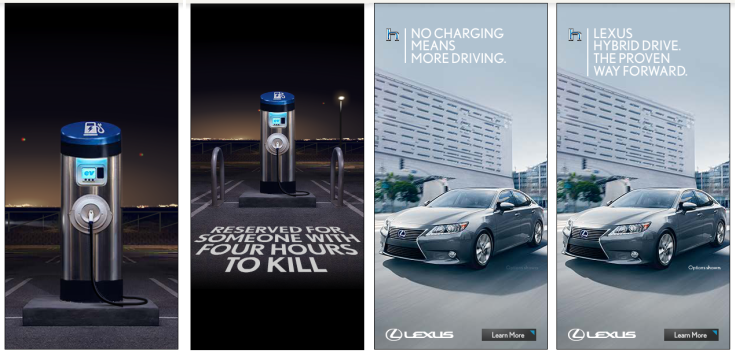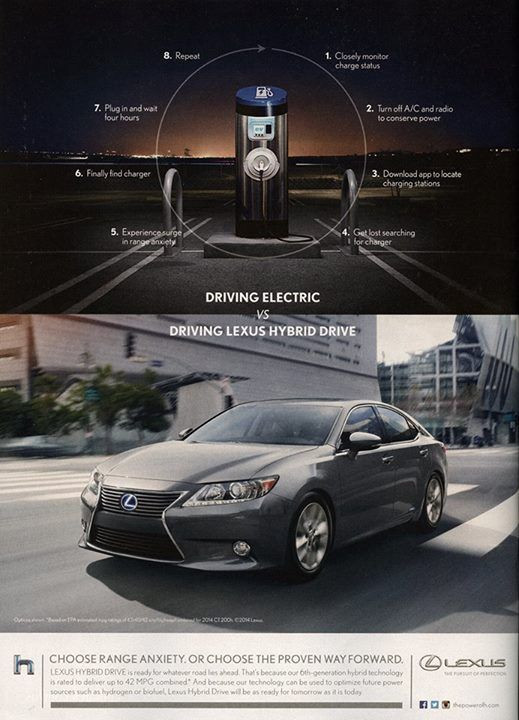Lexus Advertisement For Hybrid Cars Has Infuriated Electric Car Fans Who Accuse Toyota Of Stoking Fear

“Closely monitor charge status. Turn off A/C and radio to conserve power. Get lost searching for charger. Plug in and wait four hours. Repeat.” With those words in the latest Lexus ad campaign deriding fully electric cars, Toyota has made enemies of electric car fans in the U.S., who want to see more cars like the Nissan Leaf, Mitsubishi iMiEV and the Tesla Model S on the road.
“Maybe Lexus still has this ad out there in an attempt to counter the fact the Japanese automaker is losing sales to Tesla?” remarked the green-car blog InsideEVs, a reference to comments made by Brian Smith, a Lexus vice president, regarding the Tesla Model S sedan outselling the Lexus LS flagship full-sized luxury car in the first half of the year.
Earlier this year Lexus retracted a similar swipe at electric vehicles (EVs) after the EV advocacy group Plug In America pointed out that the data used in the video was out of date. In the earlier ad, Lexus suggests public charging outlets require four hours to top off a vehicle’s electric battery pack from empty, and it lowballed the amount of current charging infrastructure. Fans of the lower-emission green cars were quick to point out that public EV charging outlets put out 240 volts, reducing the time to charge, and that most EV owners do most of their charging at home when they’re not using the cars.
Toyota pulled the video making the claims, but ads making the same four-hours-to-charge claim are appearing in print. One of the ads caught the eye of Tesla board member Steve Jurvetson, who accused the world’s largest automaker of “stoking fear.” “I wonder if their [Toyota’s] employees will look back with pride,” Jurvetson said on his photo blog, showing the ad that appeared in Wired magazine last month.

Toyota Motor Corp. (TYO:7203) has pulled no punches in its fight against electric cars. The company, which was the first to make hybrid-car technology mainstream with its Prius, insists the future of driving isn’t lithium-ion batteries but rather hydrogen. Its 2015 Toyota FCV will be out in Japan next spring and will come to limited markets in the U.S. and Europe later next year. Earlier this year Tesla Motors CEO Elon Musk derided the technology, helping to open a schism between EV fans who point out that hydrogen requires fossil fuels and hydrogen fuel-cell supporters who fire back that electric cars are largely dependent on coal and natural gas.
The latest anti-EV Lexus ad captured the attention of Canadian Chevrolet Volt plug-in hybrid electric vehicle owner Steve Koopman, who used his Photoshopping skills to issue a point-by-point response to the ad.
@AdoptaCharger - OPINION/ MORE- @Chevyrolet Volt Extended Range EV Owner @koopy Slaps Back At #antiEVZombie @Lexus pic.twitter.com/trujXKpVjA
- Thomas J. Thias (@AmazingChevVolt) August 31, 2014Koopman says that Chevrolet’s OnStar app monitors the Volt’s charge status, that he does 95 percent of his charging at home, and that he’s happy to get the equivalent of 100 miles per gallon with the Volt, which can travel 37 miles (combined city/highway) in electric mode before switching to gasoline.
© Copyright IBTimes 2024. All rights reserved.





















